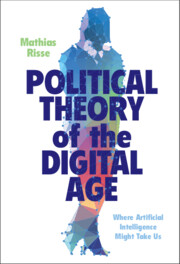Book contents
- Political Theory of the Digital Age
- Political Theory of the Digital Age
- Copyright page
- Dedication
- Contents
- Preface
- Acknowledgments
- 1 Introduction
- 2 Learning from the Amish
- 3 Artificial Intelligence and the Past, Present, and Future of Democracy
- 4 Truth Will Not Set You Free: Is There a Right to It Anyway?
- 5 Knowing and Being Known
- 6 Beyond Porn and Discreditation
- 7 The Fourth Generation of Human Rights: Epistemic Rights in Life 2.0 and Life 3.0
- 8 On Surveillance Capitalism, Instrumentarian Power, and Social Physics
- 9 Data as Social Facts: Distributive Justice Meets Big Data
- 10 God, Golem, and Gadget Worshippers: Meaning of Life in the Digital Age
- 11 Moral Status and Political Membership: Toward a Political Theory for Life 3.0
- Epilogue
- Bibliography
- Index
8 - On Surveillance Capitalism, Instrumentarian Power, and Social Physics
Securing the Enlightenment for Digital Lifeworlds
Published online by Cambridge University Press: 02 February 2023
- Political Theory of the Digital Age
- Political Theory of the Digital Age
- Copyright page
- Dedication
- Contents
- Preface
- Acknowledgments
- 1 Introduction
- 2 Learning from the Amish
- 3 Artificial Intelligence and the Past, Present, and Future of Democracy
- 4 Truth Will Not Set You Free: Is There a Right to It Anyway?
- 5 Knowing and Being Known
- 6 Beyond Porn and Discreditation
- 7 The Fourth Generation of Human Rights: Epistemic Rights in Life 2.0 and Life 3.0
- 8 On Surveillance Capitalism, Instrumentarian Power, and Social Physics
- 9 Data as Social Facts: Distributive Justice Meets Big Data
- 10 God, Golem, and Gadget Worshippers: Meaning of Life in the Digital Age
- 11 Moral Status and Political Membership: Toward a Political Theory for Life 3.0
- Epilogue
- Bibliography
- Index
Summary
“Surveillance capitalism” is a term coined by Shoshana Zuboff to draw attention to the fact that data collection has become so important for the functioning of the economy that the current stage of capitalism should be named for it. “Instrumentarian power” is a kind of power that deploys technology to obtain ever more knowledge about individuals to make their behavior predictable and thus monetizable. “Social physics” is a term used by computer scientist Alex Pentland to describe the potential of quantitative social science to put Big Data to beneficial use. The primary goal of this chapter is to discuss what it takes to secure the Enlightenment for digital lifeworlds. Since this chapter is the last in a row of chapters concerned with rights, we also discuss (and reject) the position that rights, especially human rights, are enough to articulate a promising normative vision for society. This discussion draws on insights from Horkheimer and Adorno’s Dialectic of Enlightenment, which has synergies with Zuboff’s work. Contrary to a neoliberal understanding, a strong view of democracy, as discussed in Chapter 3, is also required for a promising normative vision for society. So is a plausible theory of distributive justice, as discussed in Chapter 9.
- Type
- Chapter
- Information
- Political Theory of the Digital AgeWhere Artificial Intelligence Might Take Us, pp. 160 - 182Publisher: Cambridge University PressPrint publication year: 2023

